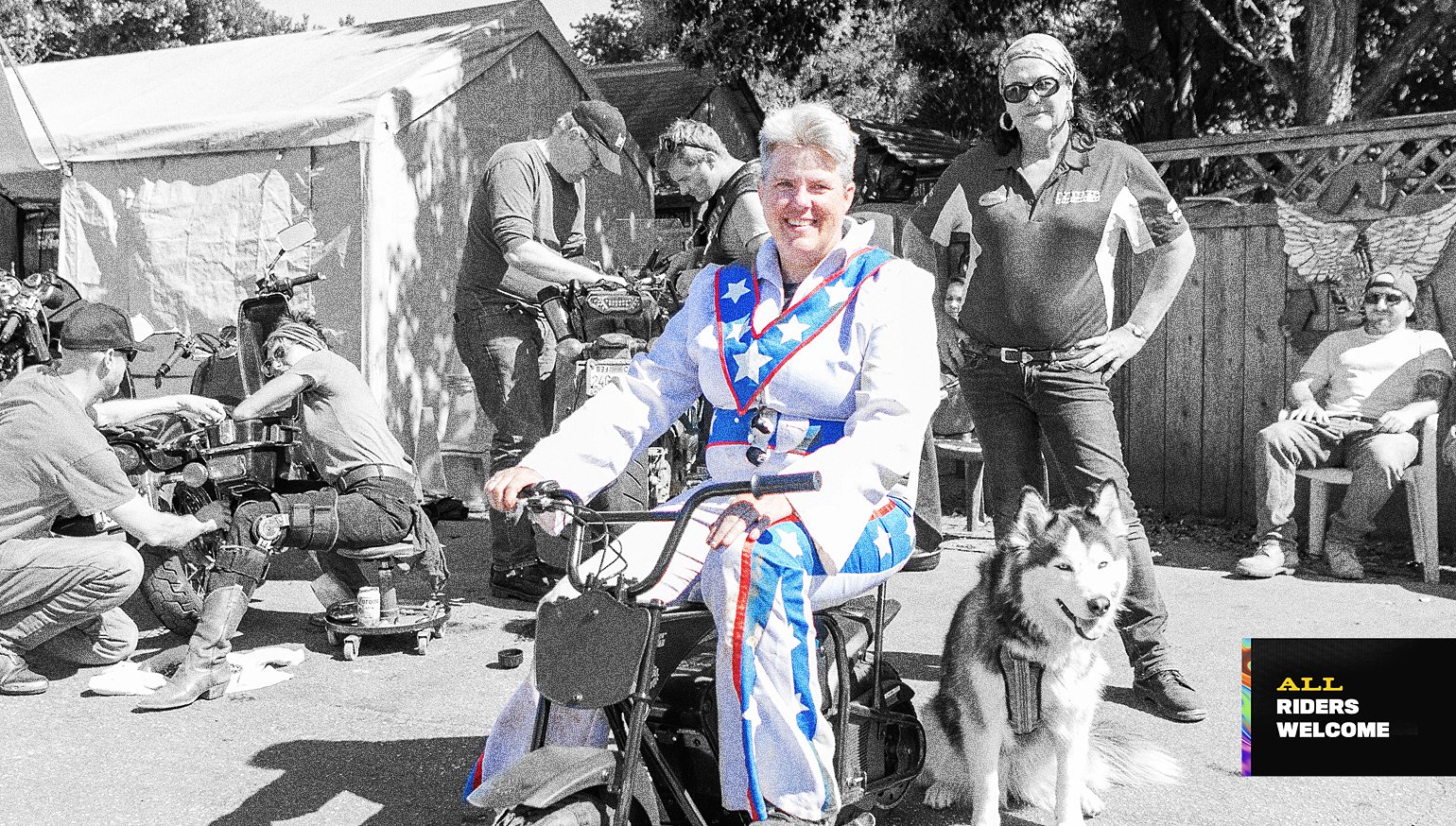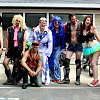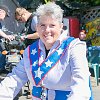During Pride Month, we're celebrating riders who stand up, stand out, and build inclusiveness in motorcycling by example, so we've got some questions for Liza Miller of Re-Cycle Garage and the Motorcycles & Misfits podcast. Master mechanic Emma Booton, a fellow Misfit and Re-Cycle co-founder, joins Liza for this interview.
Common Tread: One of the major themes running through your community garage and your podcast is this idea of misfits. What draws you to misfits, and drives you to bring them together? What does the term mean to you?
Liza Miller: The podcast came out of the community garage, which attracted all sorts of people. But early on, people realized that we were totally inclusive. The garage was a place where everyone felt free to be themselves.
We chose the name Misfits because, on paper, you wouldn't think to put us in a room together. By age alone, we cover many different decades. I mean, we've got 50-year-olds hanging out with teenagers. Every gender, every sexual identity, through all the things, passion for motorcycles is the thing that bonds us all together. Nothing else matters. That's why we call ourselves misfits, because anything goes. As long as you like motorcycles, you're in.
Editor's note: See more #pridemoto stories.
CT: Motorcycles themselves are like the misfits of the road, right?
LM: I guess you could say all motorcyclists are, in a way, a little bit rebellious. We're not choosing comfort or convenience. We choose motorcycles. Everyone can speak for themselves, but for me, it’s not a choice. I knew I was a biker before I knew I was gay!
CT: So how did you get started with motorcycling?
LM: Like I said, I always knew I wanted to ride. I was that five-year-old girl hanging out the back of the gas station, or waiting at the stop light watching the Hell's Angels and saying, “Nice hogs!” I wanted a minibike so badly, and I finally got one when I was 12. I talked my friend’s stepfather into teaching me how to ride on his GS650. Once somebody showed me how a motorcycle worked, whenever anybody asked if I knew how to ride, “Yes!” was my answer. “Yes, please let me borrow your BMW.” At every opportunity, I borrowed people's bikes and that was freedom.
CT: Did you come from a motorcycling family?
LM: My father worked for the National Highway Transportation Safety Administration, okay? Motorcycles were not something my family did. He got one once when I was a baby, had it for one day and then sold it because it freaked him out.
Emma Booton: My background is also similar to Liza's in that, once I saw [motorcycling], it didn't matter that it was outside of what my family or friends were into. That was just what I wanted, from the moment I saw it. As a small child, my babysitter’s boyfriend gave me a ride on a 1971 Triumph Bonneville. I was actually sitting on the tank holding on to the handlebar, you know, and I couldn’t reach the grips. That was it, I was done.
It's funny. I can't remember the boyfriend’s name. It might have been Ross? I can't remember my babysitter’s name, either. But I can close my eyes, and I can see the color of that bike. I’m right back there. I remember reaching down and putting my hands on the tank and feeling how cold it was.
I got my first bike at 16. I had all my bedroom walls covered with motorcycle posters, all the little plastic models, all the diecasts… I'd be sitting in school, and if I heard a bike, especially a British bike, my attention was gone. “Oh shit, that's a 650 Super Rocket!”
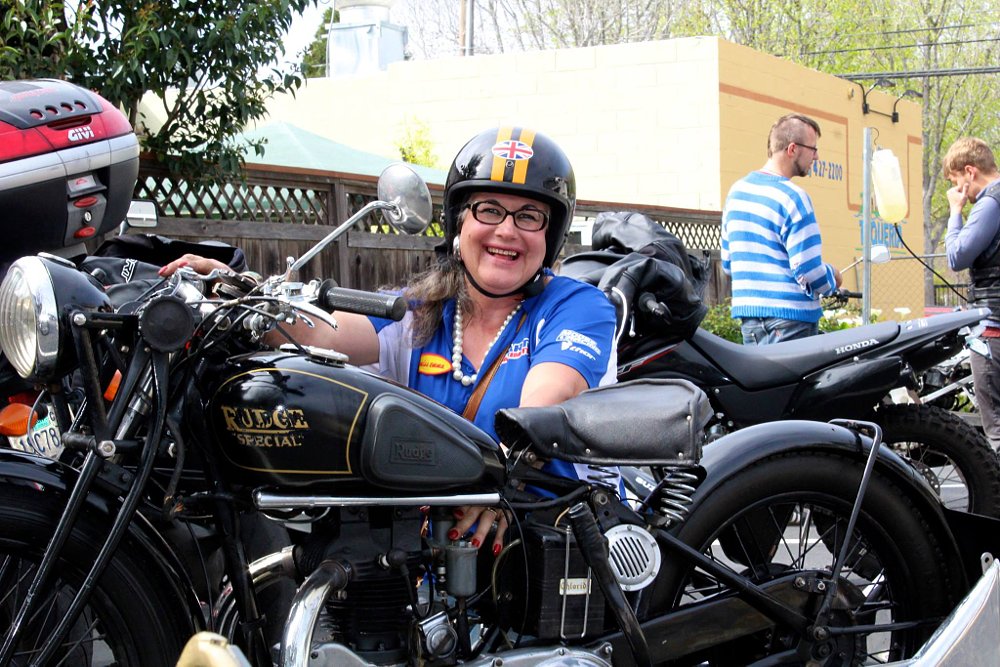
CT: What doors opened for you once you were out on two wheels?
LM: Well… Once I got a motorcycle at 17, I had to hide it down the street. My parents didn’t know I had it. And I wrecked on the highway the day I picked it up, with no gear and a 75 cent helmet from the thrift store. I got road rash, went to the hospital, and my friend took me back home. I then called another friend to give me a ride back to the bike. where I picked it up off the side of the freeway, and rode it home that same day. Every time I got back on that bike to ride it, my limbs would start shaking from the nerves.
I made a decision: I knew I needed to ride. I decided to push through this mental thing and ride. I got on the freeway, and I forced myself through it, got myself to relax, and [the nerves] went away.
CT: So even though it scared you, and hurt you badly, you consciously chose to make motorcycling a part of your life.
LM: Yes, I felt fear. And a lot of people give up riding because of fear. I just knew that [riding] was more important to me than the fear, and I pushed through.
CT: How did you arrive at a place in your riding career where you opened a community garage for other motorcyclists?
LM: I was fortunate as a child that my dad loved tinkering. When I was five, I got my first tool set and wrenched on my bicycle. I loved and collected tools, built a chopper, then a cafe racer, and eventually I had a whole garage and some experience behind me. I found that there were people who wanted to buy a cheap bike because they could only afford a cheap bike, and I helped people find these cheap bikes. But then they wouldn't maintain them or ride them enough. Batteries would die, or the carbs would get clogged, and they couldn't afford to fix them. It crushed me to see these cool bikes abandoned in backyards.
So I just thought, you know what, I'm going to help people. I'm going to help them find the bike and then I’ll teach them how to work on it. That was my concept. I had a few tools, and I knew how to find communities.
EB: For me, I found myself quite lonely in school before I got my bike. Then, suddenly, I had cool friends, and I had this community to hang out with. I was in with the cool kids, and I got very good at fixing motorcycles quite quickly. I've been a professional wrench now for 45 years. And the stupid thing is, I have my own shop and I work at it all week. And by the weekend, I still haven't had enough of motorcycles, so I'll come over to Re-Cycle garage and help out.
The key at the Re-Cycle Garage is empowering people to work on their own bikes. Even if they’ve never worked on their bikes before, we tell them to just try a few things. We’re not going to let them get too far out of shape with something incredibly simple. Change the oil, or adjust and lubricate a chain… You see them just bloom like a flower.
Our policy is that once you've done a task, you become the perfect tutor for somebody who's never done it. And so the knowledge is passed. People keep coming back to help other people.
CT: How many years have you run Re-Cycle Garage?
LM: 15 years, plus whatever informal years were before that. It was slow for the community to build, but it grew. And I wasn't a real mechanic. I didn’t know how to do everything, but we’d buy a manual and figure it out. Then, when Emma joined us, the garage became a whole new thing. Emma really knows what she's doing and can really teach people.
EB: When I actually wrench for a living, I speak a completely different language. When I’m dealing with people who are just starting out, I simplify, I express things in terms for somebody who's never held a wrench. Between my shop and Re-Cycle Garage, guess which is my favorite?
CT: Inclusiveness, and nurturing the sense of agency that comes with a screwdriver or a wrench in hand, must play a huge role in your garage’s long run. Many community garages don’t last more than a few years.
LM: Well, the biggest difference is that ours is free. It's not a business.
EB: And ours is run by women. We're not running that garage to show you how great we are. There is no room for giant egos. I want everyone to have the minimum amount of mechanical ability to look after their bikes. A lot of these garages, in my experience, are places where people get yelled at if they do the wrong thing. That's so far removed from what we do. We use the same rule we learned on our mother's knee, the golden rule. You treat people exactly as you want to be treated yourself. So you treat people with kindness, respect, and patience.
LM: Absolutely. The people who come here, I give them a sense of ownership. Yeah, sometimes tools go missing, but way more tools have been donated than have gone missing. People who come to the garage have pride in their part of this community.
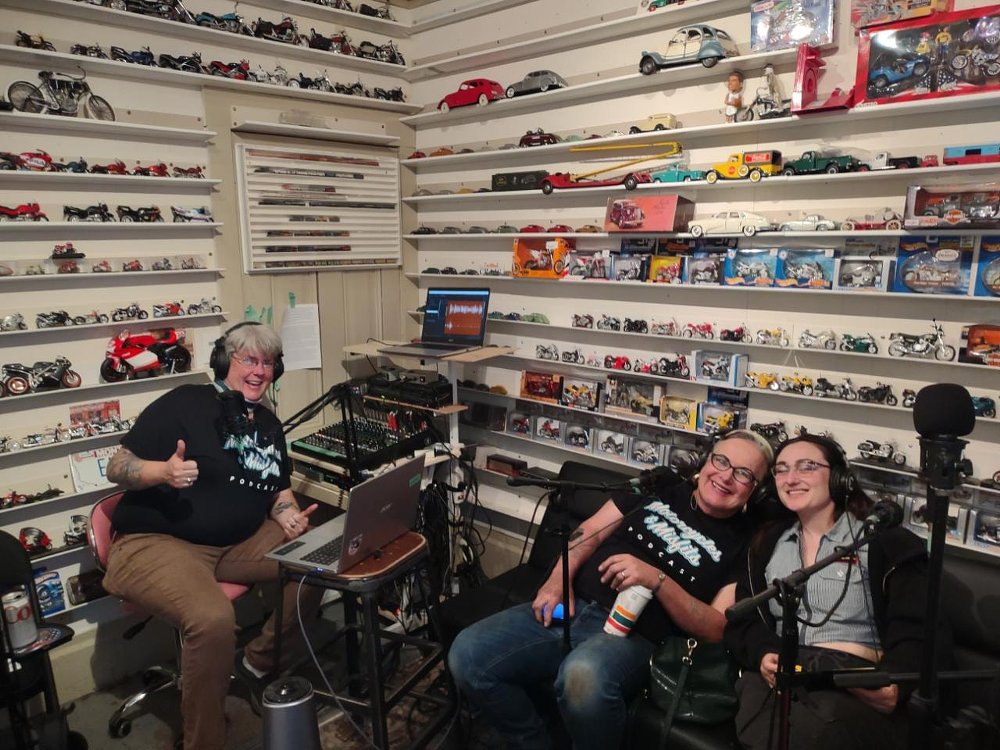
CT: And your community extends to people who can’t physically visit your garage through the podcast. How long have you been producing Motorcycles & Misfits, and what’s it all about?
LM: We're going to hit episode 500 by the end of the year. We were doing podcasts before podcasting went mainstream. We have a lot of fun making the show, and to a certain extent, we apply the same rules to the podcast as we do to the garage. We try to draw people in and produce [each episode] in a very relaxed manner.
EB: Liza works extremely hard to put that content out. The effort that goes on behind the scenes is just off the charts, but it's all very intimate between us. My vision of the podcast is, we're all friends who are hanging out. We're talking shit about anything, and you're invited, too. I think our record is 22 people on one show for a Christmas episode.
LM: Yeah, back in the old days, the studio was actually in the garage itself. We would literally close down at 4:30 or 5:00, put all the tools away and then the mics would come out. We'd sit in the garage and do the podcast right there.
EB: One memorable night, I was talking about something and everybody else in the room had this look of horror on their faces. On a beam above me, a giant rat just walks across and his tail was right by my head.
LM: Rats were rare. There are a few episodes where the camera caught a possum while we were recording. If there's any doubt about, you know, how real this place is, just watch those videos. You’ll see the possum peeking in the corner.
EB: That’s really how it is. We are hanging out in the garage, doing our thing, and we would love for you to come join. We’re all friends. Although nobody on the planet annoys Liza like I do. I drive her absolutely bananas. It's a very, very real friendship. All the misfits, and they come and go. They’re traveling characters, and their bikes are, too. We love scooters, mopeds, choppers, cruisers, race bikes, adventure bikes… We love all two-wheeled bikes.
CT: As women who see no place for ego in motorcycling, what challenges did you face building your garage and podcast communities?
LM: A lot of women have stories about not being catered to at a dealership, or men pulling up next to them and talking down to them. I never experienced that. I didn't know girls weren't supposed to ride motorcycles, it never dawned on me. Every time I go to a dealership, I look for the salesperson, put my hand out, and say, “Hey, I'm Liza. What's your name? I'm interested in this bike. Tell me about it!” I just take control of things. That’s the way I am.
EB: Classic bikes are pretty much what I do. Classic bikes tend to be ridden by older guys, very conservative and traditional guys. That's the customer base. And I absolutely have to be the smartest person in the room because otherwise, they will walk all over me. It's certainly not all bad. I usually whip them into shape! (laughs) My shop, my rinky-dink little 800-square-foot shop is on the Honda CBX list of approved repairers. It's on the Vincent Black Shadow list of approved repairers. I repair bikes for the Moto Talbott Museum, the Jameson Classic Motorcycle Museum, and I've got three bikes going on the lawn at The Quail next weekend.
[Interview break while Emma gives a virtual tour of her incredible shop and the motorcycles inside it.]
LM: I'm really fortunate in that the group of people that we have can do all these things. I kind of create the frame and then everyone adds all their own color to the painting. Does that make sense?
The thing I've learned about doing what we do is that you’ve got to ask if you want to get a yes. And because I've asked, we've had TV stars, CEOs of motorcycle companies, Hall of Famers, racers… I just have this dumb belief that we can do this, and so I go for it, and sometimes it pays off, you know?
CT: What advice would you give to someone who feels like a misfit, and wishes that they had that confidence?
EB: If somebody is a person of color, if somebody is in the queer community, or in any marginalized group… Find your community, find your support group and go with it. Now, as much as I love motorcycles, I’m very active in the queer community, as well. Find your strengths in friends. We all have something in common. All we've got to do is find it. The finest poet in the world was Shakespeare, but the second finest was Ralph Waldo Emerson. He said, “A friend may well be reckoned the masterpiece of nature.”
LM: I'll build off of that. When I first moved to Santa Cruz, I started trying to find the gay community. And I didn't find anyone with common interests. I wasn't connecting. But then I found the motorcycle community here, and that is what I connected with. Now, when you come to our garage, your age, sex, gender, none of that matters. Just teaching and empowering.
EB: I think it's pride for both of us. You'll get people who are told, no, you can't do this, you're not good enough, you're not strong or smart enough… And then we get them! You see this change come over them, the most wonderful thing in the world, just that spark. And it's not just about motorcycles. Now they have confidence.
LM: John Dalton was one of our early guys. I taught him how to do basic stuff on his bike. He moved away and like a year later, I got a message from him. He was so stoked because his neighbor’s VW bug wouldn’t start. He didn’t know how to work on cars exactly, but he took a look and realized that it was very similar to his motorcycle, so he was able to help get the car running again. He couldn’t believe that he just did that. He didn’t realize he had that ability, and it was an awakening for him. It has nothing to do with who you are on the outside. It’s who you are on the inside. A lot of people aren’t aware of what they're capable of doing, so we show them.

CT: How have you used motorcycles to promote openness and inclusiveness, through events or other forms of raising awareness?
LM: Every year when the Pride Parade begins, all the Misfits show up here, and we pull out costumes. Everyone gets dressed up and we go downtown to ride in the parade. The thing that I love is that a lot of people in that picture [above] are not queer. But they don't care because they are part of the Misfits, and we just love everybody and everything.
EB: That's our pride, right? And if I could just have a word about inclusivity here… Oftentimes you'll find within queer communities that outsiders aren't welcomed. It's very easy to be "inclusive" with people who think and act like you. The challenge comes with people who don't think like you, but we still welcome them in. “Welcome them in” is the only rule that we've got.
For some people who’ve led sheltered lives, that can be a bit of a challenge in itself. Of course, we get there, and it’s usually clunky. But we get there. We’ll break them down!
It's no secret that Liza and myself are queer. But it's something that we rarely talk about because it's not relevant in the garage. Come on in, here's the wrenches, and here's the beer!
You can find Re-Cycle Garage behind 413 Laurel St, Santa Cruz, CA 95060. Follow Liza, Emma, and the rest of the Misfits on the Motorcycles and Misfits podcast from their website here.




